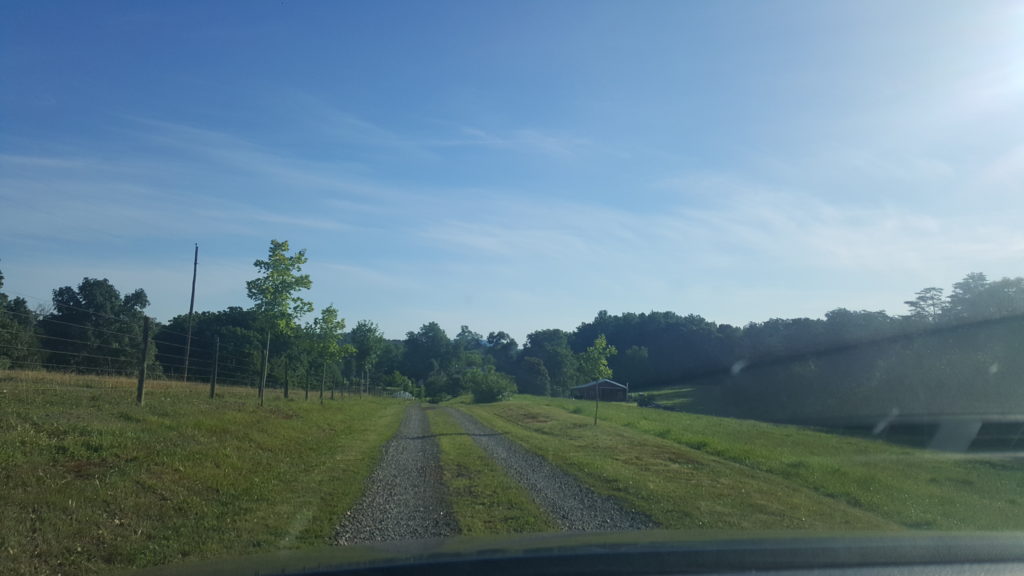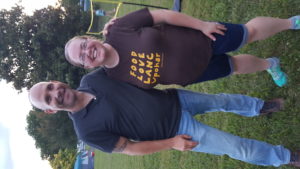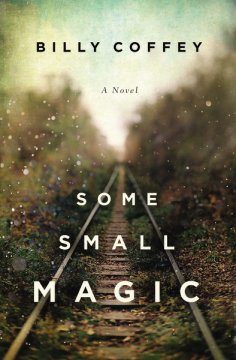It is a weekday, and I’m sitting on the porch, just after noon. A gentle breeze accompanies this warm summer day, and I am basking in it.
Inside, my house is empty, husband off to work, kids 800 miles away in Illinois with their grandparents. I am supposed to bask in this time alone, aren’t I? I am an introvert, after all. But I am surprised to find that I do not love it, all this quiet, all this “me time.”
An open week stretches ahead of me, and I am a little bit frightened by it all. No appointments. No people who need something from me. No one expecting anything from me.
What is this madness?
—
I drove 470 miles total this weekend, all but a few of the miles by myself. I went to a writing retreat in Virginia, the best of its kind in my opinion, and probably one of only a few things that could compel to make such a drive by myself.

The morning I was to leave, I sat in the parking lot of my bank, hands shaking, heart rate increasing, as I thought about the roads that lay ahead of me. Most of my travels in the last 12 years have been with at least my husband by my side, usually our kids along, too. This brings with it a different kind of anxiety, but me being responsible for myself and the car and the trip overall was almost too much to bear.
Halfway through the trip, I wondered if I’d made a mistake. Gusty winds swept across Pennsylvania and Maryland forcing me to grip tight the steering wheel and mouth words of prayer that my car, back from the body shop for less than a week, would keep its hold on the road. I am a nervous passenger when anyone else is driving but more nervous when I am the driver, apparently. The driving directions were simple, so I tried not to use the GPS but did not take the bypass around Leesburg and ended up in the middle of town when all I wanted to do was stop at Chipotle for lunch. A small delay but a timely reminder that companions make good navigators. (I am usually the navigator, and I’m not always good at it. I lose focus staring out the window, and I rely too heavily on the computerized GPS to tell me what to do and when.)
I made it to my destination without incident and met one of my two roommates before I unloaded my things and we got back in the car to head to the farm where the retreat was being held. I consulted the GPS and saw a back road that looked interesting. I’d been on the highways long enough for one day, so I suggested we take it. My roommate was agreeable, and I let the GPS guide us, but I missed a turn and we found ourselves on a gravel road that led straight into someone’s private driveway. I had a moment of panic about rural Virginia, but I was less afraid because there was someone else with me in the car. We righted our course and found the correct back road, which led us across a one-lane wooden bridge that people were sitting on, legs dangling above a creek where others were swimming. The Pennsylvania license plates must have been a sight.
We had taken a more interesting route to the farm, certainly not the most direct or logical, and I joked all evening about our small adventure. We would take the highway the next time.
—
When it comes to writing, I have been journeying solo for more than a year. I have been traveling by myself, minimally relying on technology and sporadic texts to real-life people, to get me to my destination. But I have stayed pretty close to home with my writing. There are writing roads I can navigate almost with thought, like driving around my hometown or my current city. I don’t need GPS here (most of the time). But when I have ventured out, I have taken some wrong turns because I don’t know the way. Even with a technologically advanced guide, I am in unfamiliar territory, wondering if this going to end well.
Weeks ago, a friend planted the seed of an idea for a next step in my writing journey. It has been tucked away in a back corner of my mind, and I walked into the retreat weekend knowing that this would be my time to think about it more. To speak the idea out loud amongst other writers and ask for help.
Those three little words–ask for help–are terrifying for me, and I can’t explain why.
I did not want to put pressure on the weekend to produce some definitive result, but I also know that the space to open up heart, mind and soul cannot help but yield some result. I kept the idea close at first and then blurted it out to a writer friend I trust within the first hour of the retreat. The next day, after an informative and encouraging talk by Jane Friedman, I asked that same friend for recommendations about the idea.
On day three of the retreat, with tears in my eyes after another encouraging and slightly overwhelming group conversation, I mentioned the same idea to another writing friend I trust. By the time our closing conversation of the retreat happened and we were asked to set a goal and a deadline, it was pretty clear to me what my goal was going to be.

So, here it is: I’m going to partner with a writing coach by the end of the summer. I have about four people to choose from, but first I need to decide what I need from a coach. Let me tell you why this is a big deal for me.
I can’t really remember a time in my life when I wasn’t writing. I have a degree in writing. I have decades of professional experience writing and more publishing credits to my name than I can count (thanks to being a reporter for a daily newspaper). Blog posts, articles, essays, that’s like driving on familiar roads to me.
Book-length projects–especially fiction projects–that’s a cross-country drive without GPS. I am lost, but not without hope to find my way back to the main road again. But there’s a little voice inside of me telling me that I shouldn’t need help with this. That I should be better at it. (That voice is a liar, by the way. Not one writer I said this to agreed with the voice.) That’s like telling someone who grew up driving on the flat roads of the Midwest that driving on mountain roads in Colorado in winter will be no problem.
—
I don’t know why asking for help is so hard, and I know I’m not the only one who feels this way.
I am learning to ask for help in a lot of areas of my life. I have a team of healthcare providers to help my body function at its best. I “ask” my massage therapist to help me relax and work the tension out of my muscles. I “ask” my chiropractor to keep my spine in alignment so I can move through my day without pain. I “ask” my primary care provider to assess the aches and pains and bodily functions I’m experiencing for concerns and optimal health.
This is just one multi-layered example of how asking for help is necessary.
It is harder to ask for help in an area in which I feel more competent than say, physical health, but it’s still normal and good. I will say it again for myself to hear:
Asking for help is normal and good.
I don’t know about you but I’m not proficient at everything. I don’t know everything there is to know about everything. I don’t have experience in every field of study or arena of life. I need a coach, a guide, someone who can travel with me and help me get back on the right course.
I expect this has application in many areas of life, the least of which is that I know this about myself and can admit it. I was raised in an era when women were gaining independence in their lives, from their homes, for their futures, and taken to an extreme, I could try to rely on myself for everything. But it is too much pressure to know it all and do it all and be it all.
Asking for help. Acknowledging my weaknesses as well as my strengths. These practices will serve me well, I believe.
So I will use the GPS without shame when traveling alone. I will ask others to use their strengths to serve my well-being. And I will offer my strengths to those whose well-being can be served by me.
This is the kind of mutuality the world needs. The kind of interconnectedness that will lift us all up. Maybe it won’t save the world, but it might save us from going through life on our own.

